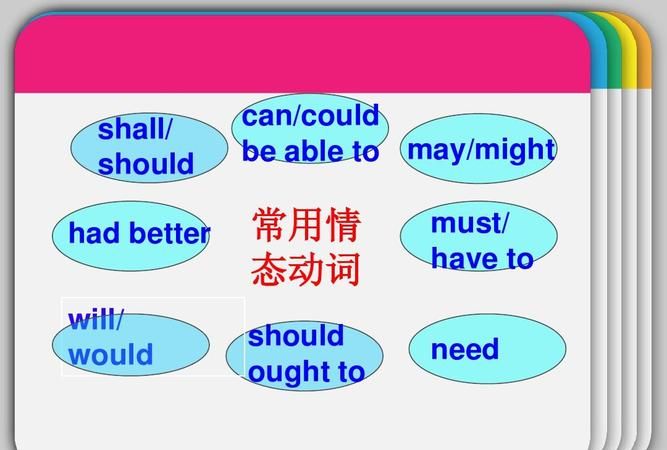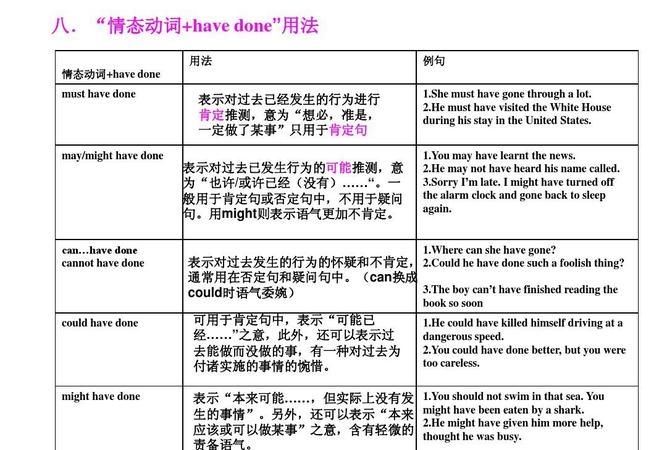本文目录
情态动词有哪些英语单词
主要有: can、 could、 may、 might、 must、 need、 ought to、dare、 dared、 shall、should、will would等等。 情态动词在句子中是没有人称和数的变化,常用来表示委婉的语气。
一般情况下, 情态动词在英语句子中主要有四层含义。
1、情态动词可以用来表示能力、体力、知识、技能等等。
例:Can you swim?
翻译:你会游泳吗?
2、 情态动词可以用来表示请求和允许。
例: Can I go to your home?
翻译:我可以去你家吗?
3、情态动词可以用来表示客观可能性,要是指客观的原因。
例:The pool can hold sixty children swimming.
翻译:这个游泳池可以容纳六十个孩子游泳。
4、情态动词可以表示推测,主要用在疑问句、否定句和感叹句中。
例: Can this new is true?
翻译:这个消息是真的吗?

扩展资料:
一、can
1、含义:aux. 可以;能。n. 罐头。v. 罐装;<口>解雇。
2、用法
can用作情态动词的基本意思是“能,能够”“可以”“可能,会”,可表示体力、智力能够完成一件事情或环境赋予的能力; 也可表示由于环境或其他因素而产生的可能性,用于疑问句或否定句中; 还可表示环境、条件或法律的许可。can也可表示要求、拜托、请求、惊讶等。
How can you say that?
你怎么可以这样说?
二、need
1、含义:v. 需要;必需。n. 需要;必要;缺乏。aux. 需要,必须(无时态、人称变化,后与不带 to 的动词不定式连用,多用于疑问句和否定句)。
2、用法
need用作情态动词时没有人称、时态及语态的变化,后面须接不带to的动词不定式一起用作谓语,表示“必须,必要”。一般只用于否定句或疑问句中,也可用于含有否定意味的肯定句中。
need用作实义动词的基本意思是缺少急切需要的东西,强调急需。
need是及物动词,可接名词、代词、动词不定式、动名词作宾语,也可接以动词不定式或过去分词充当补足语的复合宾语。
I don't have the need for such an expensive car like that.
我还不需要一辆那么昂贵的汽车。
情态动词有哪些英语单词
英语中情态动词用以表明说话者对某一行为的态度和观点,包括能力、可能、命令、要求等。情态动词不能单独做谓语,只能和后面的动词一起构成谓语,且没有人称与数的变化。常用情态动词主要有:can,could,may, might, must, have to, need, dare, shall, should, will, would, ought to, used to, had better, would rather。希望这个回答能够有所帮助。

情态动词有哪些英语单词
情态动词 (Model Verbs) 又称为情态助动词 (Model Auxil-iaries), 主要有can, may, must, could, might, shall , should, will, would, ought to, need, dare等。情态动词与其他动词连用表示说话人的语气。情态动词可表达建议、要求、可能和意愿等。情态动词没有人称和数的变化。情态动词部分重点测试以下内容:
(1)情态动词+动词完成式: must have done
(2)情态动词+动词进行式: must be doing
(3)情态动词+动词完成进行式: must have been doing
(4)某些情态动词的特殊用法: need
一、情态动词+动词完成式
情态动词+动词完成式即“情态动词+ have + done分词”,表示对过去行为或动作进行推测、评论或判断。
1. must have done
must have done 表示对过去某事的肯定猜测。其否定或疑问形式都用can(could) 来表示.
例如: Since the road is wet, it must have rained last night.
He can’t have missed the way. I drew him a map.
“The dictionary has disappeared. Who could have taken it?”
当然对现在发生或将来发生的事情,要用must do 表示猜测, 否定为can’t do.
He must understand that we mean business.
You must be hungry after a long walk.
2.may / might have done
may / might have done 表示推测过去某事“也许”发生了.may 比 might 表示的可能性在说话人看来稍大些。例如:
I can’t find my keys. I may / might have left them at the school yesterday.
3. could have done 在肯定句型中, 往往用作委婉的批评. 本应该做什么,而没做; 有时也用作猜测.
You could have told us earlier.
Tom could have taken the dictionary.
4. ought to / should have done和 ought not to / shouldn’t have done
ought to / should have done 和 ought not to / shouldn’t have done 用于对已发生的情况表示“责备”、“不满”,分别表示“本应该…”和“本不应该…”。例如:
1)With all the work finished, I should have gone to the party last night.
2)You ought not to have made fun of him. He is not the one you laugh at but learn from.
5. needn’t have done
needn’t have done 表示过去做了某事,但没有做的必要, 意为“本没必要…”。例如:
You needn’t have waken me up; I don’t have to go to work today.
注:表示推测过去某动作发生的可能性时,就表示的可能性程度而言,must最大,could其次,may更次之,might最小。例如:
“I wonder how Tom knew about your past.”
“He must / could / may / might have heard of it from Mary.”
二、情态动词+动词进行式
情态动词+行为动词进行式(即情态动词+ be + doing形式),表示推测或评论某动作现在是否正在进行。例如:
1)He must be playing basketball in the room.
2)She may be staying at home.
三、情态动词+动词完成进行式
情态动词+行为动词完成进行式(即情态动词+ have been + v-ing 形式),表示推测或评论过去某动作是否正在进行或一直在进行。例如:
1)They should have been meeting to discuss the problem.
2)He may / might have been buying stamps in the post office when you saw him.
四、某些情态动词的特殊用法
1. need
考试中主要测试 need 作情态动词与作实义动词的区别。情态动词need与实义动词need 在时态、肯定、否定结构上的对比见下表。
时态 情态动词need 实义动词 need
现在时
He need (needn’t) do
Need he do….?
He needs (doesn’t need) to do
过去时
He needed (didn’t need) to do
将来时
He need (needn’t) do
Need he do….?
He will (not) need to do
注: need 一般用于否定句或疑问句.
2. dare 考试中主要测试dare作情态动词和作实义动词的区别。
情态动词dare 与实义动词dare 在时态、肯定、否定、疑问结构上的对比见下 表。
句型 情态动词dare 实义动词 dare
肯定句
现在时 dare to 少用
过去时 dare to 少用
现在时 dare/dares to do
过去时 dared to do
否定句
现在时 daren’t/dare not do
过去时 dared not do
现在时 do/does not dare (to) do
过去时 did not dare (to) do
疑问句
现在时 Dare he do?
过去时 Dared he do?
现在时 Do you/Does he dear (to) do?
过去时 Did he dare (to) do
3. can 和 may
考试中主要测试can,may或could,might表示可能性的区别及对may构成的疑 问句的回答。
(1)can, could, may, might都可以表示可能性.can, could表示潜在的可能性或理论上或逻辑判断上存在的可能性;而may, might则表示事实上的可能性。此外,can还具有“有能力”的意思,而may与might则不具此意。例如:
According to the weather forecast, it may rain tomorrow.
Any man with a little sense can see that he is wrong.
(2)May I / we …?这一类疑问句的肯定回答为Yes, please.或Certainly;否定回答为Please don’t.或No, you mustn’t. 例如:
“May we leave now?” “No, you mustn’t. You haven’t finished your home work yet.”
4. can 和 be able to
can 与 be able to 都可以表示能力,但两者在用法上有点差异:can (could)表示主观能力,不表示意愿,它的将来时用will be able to; be able to表示主观意愿,强调要克服困难去做某事。例如:
1)My grandma is over seventy, but she can still read without glasses.
5. must 和 have to
must 和 have to 都可以表示“必须”,但有几点区别:
(1)must 强调“内在的职责”、“义务”,而have to 强调“外界压力”、“不得已而为之”。
(2)have to可用于多种时态,而must一般用于现在时,其过去时与将来时分别由had to与shall / will have to代替。
(3)在回答must引起的问题时,如果是否定的答复,不能用mustn’t,而要用needn’t或don’t have to,因为mustn’t是“一定不要”、“一定不能”的意思。例如:
You must come to the classroom before eight.
2)It is raining hard outside, but I have to leave now.
3)“Must we do it now?” “No, you needn’t.”
6. used to +do, be used to +doing和be used to +do
(1)used to +v意为“过去常常”,“过去一直”;be used to +v-ing / n(名词)意为“习惯于”;be used to +v意为“被用来(做某事)”。
(2)used to只表示过去,而be used to +v-ing / n可表示现在、过去或将来。例如:
1)He used to smoke. Now he doesn’t.
2)He’s quite used to hard work / working hard.
3)The knife is used to cut bread.
7.用作情态动词的其他短语 would rather, would sooner, would (just) as soon, had rather, had better, had sooner, can not but, may (just) as well等可用作情态动词。例如:
1)The soldier would sooner die than surrender.
2)The brave soldier would as soon die as yield to such an enemy.
3)I’d rather walk than take a bus.
4)If you don’t like to swim, you may just as well stay at home.
注:这些短语后一般直接跟动词原形.would (had) rather, would (had) sooner, would (just) as soon后可跟that 引导的从句,that 常省去,从句要用虚拟语气。对现在和将来的假设用过去时,对过去的假设用过去完成时。例如:
1)I would rather you came on Sunday.
2)I would sooner you hadn’t asked

情态动词有哪些英语单词
- 01
情态动词虽然数量不多,但用途广泛,常用的情态动词有:can (could), may (might), must, need, ought to, dare (dared), shall (should), will (would)。
情态动词本身有一定的词义,表示语气的单词。但是不能独立作谓语,只能和动词原形一起构成谓语。情态动词用在行为动词前,表示说话人对这一动作或状态的看法或主观设想。情态动词只做情态动词:may, might, must等。情态动词中可做情态动词又可做实义动词:如:need, dare,can等。情态动词中具有情态动词特征:have(had,has) to,used to, ought to。情态动词中可做情态动词又可作助动词:如:shall(should),will(would)
情态动词无人称和数的变化,情态动词后面跟的动词须用原形,否定式构成是在情态动词后面加 "not"。个别情态动词有现在式和过去式两种形式,过去式用来表达更加客气,委婉的语气,时态性不强,可用于过去,现在或将来。情态动词属非及物动词,故没有被动语态。
He could be here soon. 他很快就来。
We can't carry the heavy box. 我们搬不动那箱子。
基本助动词与情态助动词最主要的区别之一是:基本助动词本身没有词义,而情态助动词则有自己的词义,能表示说话人对有关动作或状态的看法,或表示主观设想:
What have you been doing since? (构成完成进行体,本身无词义)
你一直在干什么?
I am afraid I must be going. (一定要)
恐怕我必须走了

以上就是关于情态动词有哪些 ,情态动词有哪些英语单词的全部内容,以及情态动词有哪些 的相关内容,希望能够帮到您。

